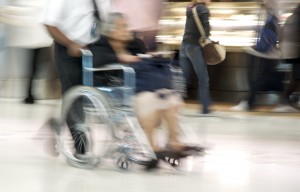 When my back problems flare up, I sometimes find it difficult to walk for long distances. On a recent business trip, I asked for wheel chair assistance to ease the strain of walking through the airport.
When my back problems flare up, I sometimes find it difficult to walk for long distances. On a recent business trip, I asked for wheel chair assistance to ease the strain of walking through the airport.
The experience helped me to better understand what it is like to have a physical condition that leaves one in less than total control. It was a humbling and revealing experience.
First, I must say that in every airport I experienced outstanding service from the personnel who are assigned to help people needing mobility support. They were efficient, patient and caring.
However, I did not realize how much I took my “able-bodiedness” for granted. It was the little things.
- Once the wheel chair attendant leaves you at the gate, what if you have to use the restroom?
- What if you would like to get something to eat or drink once you have been left at the gate? (I did not want to ask for help.)
- When the plane lands, the flight attendant usually asks that those needing wheel chair assistance wait until all of the “able-bodied” passengers have deplaned. (It seemed like it took forever and I was tired and wanted to make my way to the hotel. I had an early morning meeting.)
- In some airports, the wheel chair only takes you to the main terminal where you are transported by the larger passenger carts to the gate. In that situation, you no longer have the wheel chair and I pose questions 1 and 2 above again.
- In one airport, they did not have an accurate count of how many wheel chairs were needed so I was asked to wait until someone could come for me. I was told they were short staffed and he did not know how long it might take. Just the anxiety of not knowing “when” is stressful for someone who is used to being in charge of their comings and goings.
The other interesting phenomena, which I had heard and read about is the other assumptions that people make about you when you have a visible physical difference. They speak more loudly and slowly and in some cases are overly accommodating. The looks, meant I am sure, as compassion or understanding, felt more like pity. There were also assumptions about my age. One person (probably older than me who was also in a wheel chair) actually said, “You don’t look old enough to be in a wheel chair.” (A bit of a bias there, I think. What’s age got to do with it?)
On the positive side, it was obvious that airline staff had been trained to ask if I needed help, rather than assume and did not ask inappropriate questions or display body language that could be construed as expressing pity.
So in general, based on the way I was treated, my temporary wheel chair status was a positive experience. It was more my own “stuff” that got in the way. I felt out of control. I felt that I needed to explain that my condition was only temporary. I experienced feelings of embarrassment, inadequacy and uselessness.
It was truly humbling and a wonderful lesson in self-awareness. As a practitioner it has given me a great deal to think about relative to my own biases and assumptions as well as perhaps a better understanding of how others who are visibly differently abled may feel at times.
The path to cultural competence is a journey in continuous learning!



















I have experienced the same understanding. I had surgery that made it difficult to negotiate the halls at work, so a wheelchair was used to get me around. I had been on crutches before but never in a wheelchair. It was an eye-opening experience that has changed my point of view. I’m sure I’ve been one of those with the look that I thought was supportive but came across as pity. Not anymore. I agree we are on a path and those new experiences help us to continue our life long learning. Thank you for sharing your experience!